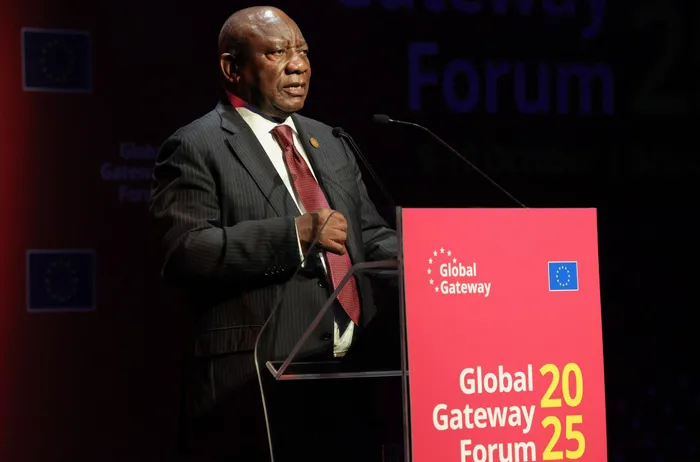Ramaphosa calls for fairer cooperation between developed and developing nations
GEOPOLITICS

President Cyril Ramaphosa delivering remarks at the 2025 Global Gateway Forum held at the Square Brussels Meeting Centre in Belgium under the theme “Advancing Global connectivity in the face of geopolitical and geoeconomic challenges” on Thursday.
Image: Supplied/GCIS
President Cyril Ramaphosa has urged global leaders and development partners to pursue fairer, mutually beneficial cooperation between developed and developing nations, saying the world’s most pressing challenges require “comprehensive, coordinated and forward-looking solutions.”
Addressing the Global Gateway Forum in Brussels on Thursday, Ramaphosa said the gathering comes at a time of geopolitical instability that is negatively affecting both global security and economic growth.
“These circumstances require comprehensive, coordinated and forward-looking solutions. They call for a renewed commitment to the peaceful resolution of conflict, respect for international law, the strengthening of multilateralism and the progressive reform of international bodies like the United Nations and the WTO,” he said.
Ramaphosa highlighted the importance of the strategic partnership between South Africa and the European Union (EU), noting that ties between the two have “evolved in scope and substance” over the years.
The South Africa-EU Summit held in Cape Town earlier this year, he said, reaffirmed shared values and deepened cooperation across multiple sectors.
Ramaphosa said the Global Gateway Forum — the EU’s flagship investment initiative — offers opportunities to advance shared priorities such as green and digital infrastructure, transport networks, pandemic preparedness, and sustainable energy transitions.
“We welcome the support this partnership provides to the development of transport networks, a just transition and climate resilience, pandemic preparedness and vaccine production, and digital connectivity,” he said.
He, however, cautioned that investment frameworks must empower African nations rather than entrench new forms of dependency.
“It is important that the substantial investments being made through the Global Gateway are structured in a manner that empowers African countries and does not replace one dependency with another,” Ramaphosa said.
“They must enable African countries to pursue development paths suited to their circumstances and to the needs of their people.”
Ramaphosa outlined South Africa’s ongoing economic reforms in energy, logistics, water, and telecommunications — reforms that aim to make the country more competitive and attractive to investors.
He said the government’s infrastructure investment drive is expanding economic capacity and meeting developmental needs.
“As a continent, Africa is striving for universal access to energy through diversification, equitable financing, and technology transfer,” he added. “The support from the EU and its member states will play an important part in this journey.”
Ramaphosa also used the platform to preview South Africa’s upcoming hosting of the G20 Leaders’ Summit, which will take place next month under the theme “Solidarity, Equality and Sustainability.”
“With around 100 of the 132 official meetings already held since we took over the presidency from Brazil, South Africa is well on its way in preparations towards hosting a successful G20 Summit for the first time on African soil,” he said.
He said the G20 must focus on resolving the growing debt burden that constrains many developing economies, stressing that “it is unacceptable that developing countries pay much more for their debt than developed countries.”
To this end, South Africa has established a G20 Extraordinary Committee of Independent Experts on Global Wealth Inequality, chaired by Nobel Laureate Professor Joseph Stiglitz, to develop actionable recommendations on tackling global inequality.
Ramaphosa reiterated South Africa’s call for reform of international financial institutions and multilateral development banks to better respond to global challenges such as climate change, inequality, and debt distress.
“We must build consensus on the reform of international financial institutions, particularly multilateral development banks, to better tackle global challenges,” he said.
“Greater support needs to be given to developing economies through climate financing, and we must act decisively against predatory mining practices and ensure fair management of critical minerals.”
Ramaphosa also reaffirmed South Africa’s commitment to working closely with the EU to ensure that shared ambitions “translate into tangible outcomes.”
“Together, we can foster inclusive growth, build resilience and create a sustainable and secure future for all our people,” he said.
BUSINESS REPORT